Related Research Articles
An investment bank is a financial services company or corporate division that engages in advisory-based financial transactions on behalf of individuals, corporations, and governments. Traditionally associated with corporate finance, such a bank might assist in raising financial capital by underwriting or acting as the client's agent in the issuance of securities. An investment bank may also assist companies involved in mergers and acquisitions (M&A) and provide ancillary services such as market making, trading of derivatives and equity securities, and FICC services. Most investment banks maintain prime brokerage and asset management departments in conjunction with their investment research businesses. As an industry, it is broken up into the Bulge Bracket, Middle Market, and boutique market.
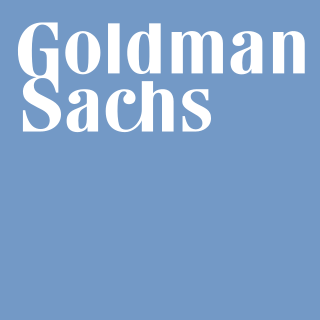
The Goldman Sachs Group, Inc. is an American multinational investment bank and financial services company headquartered in New York City.

Robert Bruce Zoellick is an American public official and lawyer who was the eleventh president of the World Bank, a position he held from July 1, 2007 to June 30, 2012. He was previously a managing director of Goldman Sachs, United States Deputy Secretary of State and U.S. Trade Representative, from February 7, 2001 until February 22, 2005. Zoellick has been a senior fellow at Harvard's Belfer Center for Science and International Affairs since ending his term with the World Bank. He is currently a Senior Counselor at Brunswick Group.
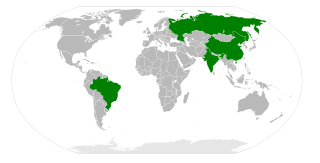
BRIC is a grouping acronym which refers to the countries of Brazil, Russia, India and China deemed to be developing countries at a similar stage of newly advanced economic development, on their way to becoming developed countries. It is typically rendered as "the BRIC," "the BRIC countries," "the BRIC economies," or alternatively as the "Big Four". The name has since been changed to BRICS after the addition of South Africa in 2010.

Martin Harry Wolf is a British journalist of Austria-Dutch descent who focuses on economics. He is the associate editor and chief economics commentator at the Financial Times.

Lloyd Craig Blankfein is an American investment banker who has served as senior chairman of Goldman Sachs since 2019, and chairman and chief executive from 2006 until the end of 2018. Previous to leading Goldman Sachs, he was the company's president and chief operating officer (COO) from 2004 to 2006, serving under then-CEO Henry Paulson.
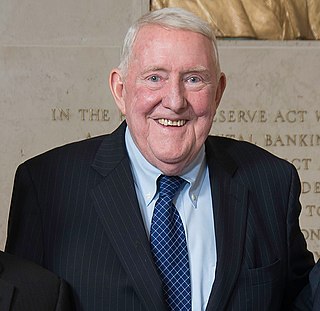
Edward Gerald Corrigan is an American banker who was the seventh President of the Federal Reserve Bank of New York and Vice-Chairman of the Federal Open Market Committee. Corrigan is currently a partner and managing director in the Office of the Chairman at Goldman Sachs and was appointed chairman of GS Bank USA, the bank holding company of Goldman Sachs, in September 2008. He is also a member of the Group of Thirty, an influential international body of leading financiers and academics.
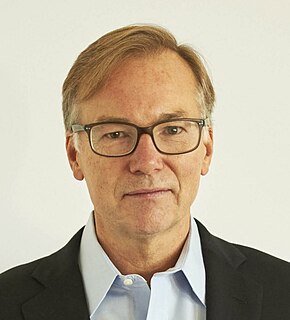
Steve Coll is an American journalist, academic and executive.

Raghuram Govinda Rajan is an Indian economist and the Katherine Dusak Miller Distinguished Service Professor of Finance at the University of Chicago Booth School of Business. Between 2003 and 2006 he was Chief Economist and Director of Research at the International Monetary Fund. From September 2013 through September 2016 he was the 23rd Governor of the Reserve Bank of India; in 2015, during his tenure at the RBI, he became the Vice-Chairman of the Bank for International Settlements.
Driss Ben-Brahim is a Moroccan-Austrian trader and investor based in London, England.

William Russell Easterly is an American economist, specializing in economic development. He is a professor of economics at New York University, joint with Africa House, and co-director of NYU’s Development Research Institute. He is a Research Associate of NBER, senior fellow at the Bureau for Research and Economic Analysis of Development (BREAD) of Duke University, and a nonresident senior fellow at the Brookings Institution in Washington DC. Easterly is an associate editor of the Journal of Economic Growth.

Terence James O'Neill, Baron O'Neill of Gatley is a British economist best known for coining BRICs, the acronym that stands for Brazil, Russia, India, and China—the four rapidly developing countries that have come to symbolise the shift in global economic power away from the developed G7 economies. He is also a former chairman of Goldman Sachs Asset Management and former Conservative government minister. As of January 2014, he is an Honorary Professor of Economics at the University of Manchester. He was appointed Commercial Secretary to the Treasury in the Second Cameron Ministry, a position he held until his resignation on 23 September 2016. He chaired the UK's Independent Review into Antimicrobial Resistance for two years, which completed its work in May 2016. Since 2008, he has written monthly columns for international media organization Project Syndicate. He is the current chairman of the Council of Chatham House, the Royal Institute of International Affairs.
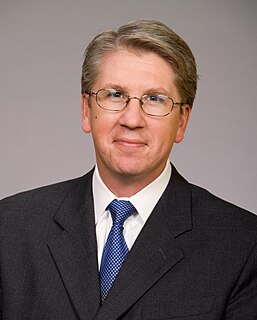
R. Scott Morris is an American author, financial engineer and quantitative consultant. He is president of Morris Consulting, LLC, Chief Investment Strategist of Blackthorne Capital Management, LLC, and served as CEO of the Boston Options Exchange from 2006-08. He has also served as Managing Director of Goldman Sachs and Partner at Hull Trading Company.
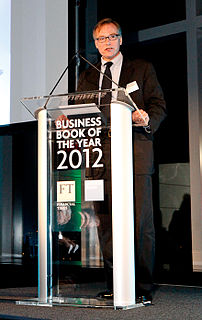
Financial Times and McKinsey Business Book of the Year Award is an annual award given to the best business book of the year as determined by the Financial Times and McKinsey & Company. It aims to find the book that has 'the most compelling and enjoyable insight into modern business issues'. The award was established in 2005 and is worth £30,000. Beginning in 2010, five short-listed authors each receive £10,000, previously it was £5,000.
Wellcome Book Prize is an annual British literary award sponsored by Wellcome Trust. In keeping with the vision and goals of Wellcome Trust, the Book Prize "celebrates the topics of health and medicine in literature", including fiction and non-fiction. The winner receives £30,000 making it "one of the most remunerative literature awards on offer."

Steven George Mandis is an American investor and the founder of Kalamata Capital. He is an adjunct associate professor in finance and economics at Columbia University Business School. Previously, he worked at Goldman Sachs and Citigroup and as a senior advisor to McKinsey. He is the author of three books: What Happened to Goldman Sachs: An Insider's Story of Organizational Drift and its Unintended Consequences, The Real Madrid Way: How Values Created the Most Successful Sports Team on the Planet, and What Happened to Serie A: The Rise, Fall and Signs of Revival.

Poor Economics: A Radical Rethinking of the Way to Fight Global Poverty (2011) is a non-fiction book by Abhijit V. Banerjee and Esther Duflo, both professors of Economics at Massachusetts Institute of Technology (MIT) and Nobel Memorial Prize in Economic Sciences laureates. The book reports on the effectiveness of solutions to global poverty using an evidence-based randomized control trial approach. It won the 2011 Financial Times and Goldman Sachs Business Book of the Year Award.
Sebastian Christopher Peter Mallaby is an English journalist and author, Paul A. Volcker senior fellow for international economics at the Council on Foreign Relations (CFR), and contributing columnist at The Washington Post. Formerly, he was a contributing editor for the Financial Times and a columnist and editorial board member at The Washington Post.
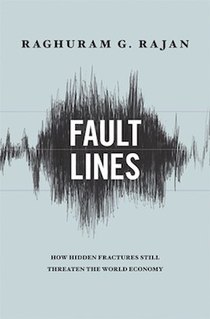
Fault Lines: How Hidden Fractures Still Threaten the World Economy is a 2010 book by Indian economist Raghuram Rajan on the underlying causes of the 2008 financial crisis, and the structural weaknesses present in the world economy. It won the Financial Times and McKinsey Business Book of the Year award in 2010.

Goldman Sachs controversies are the controversies surrounding the American multinational investment bank Goldman Sachs. The bank and its activities have generated substantial controversy and legal issues around the world and is the subject of speculation about its involvement in global finance and politics. In a widely publicized story in Rolling Stone, Matt Taibbi characterized Goldman Sachs as a "great vampire squid" sucking money instead of blood, allegedly engineering "every major market manipulation since the Great Depression."
References
- ↑ Coates, J. M.; Herbert, J. (2008). "Endogenous steroids and financial risk taking on a London trading floor". Proceedings of the National Academy of Sciences. 105 (16): 6167–6172. doi: 10.1073/pnas.0704025105 . PMC 2329689 . PMID 18413617.
- ↑ Charlotte Williams (15 October 2012). "Random House gets four nods for Wellcome Trust Book Prize". The Bookseller. Retrieved November 9, 2012.
- ↑ Andrew Hill (13 September 2012). "Biographies and economics dominate". Financial Times. Retrieved September 15, 2012.
- ↑ The FP Top 100 Global Thinkers Foreign Policy. Retrieved November 27, 2012.